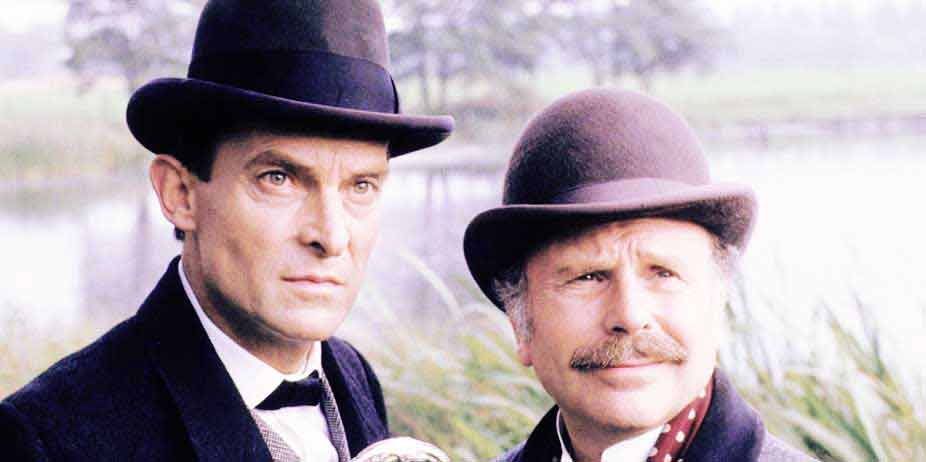 The
Sign of Four (1988)
The
Sign of Four (1988)
Before the BBC switched directors and screenwriters, there was one last great Sherlock Holmes adventure. I've seen many adaptations of this novel and this is by far the most honest to the page. It's witty, charged with energy and involves classic performances. Opening in a magnificent India-style abode, a crippled man and his small, monkey-like companion leave an obscure note on the chest of a dead man. In 221 B Baker Street, Watson (Edward Hardwicke) watches as a beautiful young woman dismounts from a carriage. She stands a moment undecided in the street before crossing into the house. Mary Morstan (Jenny Seagrove) has a singular case to present before the great detective.
Since her childhood, Mary had grown up in English boarding schools while her father served abroad. Several years before, he'd returned to London and expressed a desire to see her. Upon arriving at his hotel, she discovered he was missing. Police investigations turned up nothing and they presumed he'd fallen afoul of some dark plot. Up until recently she'd given up the chase, resigning herself to not knowing. Then, curiously, she began to receive strange packages in the mail. Each was a small box containing a single large, lustrous pearl worth a small fortune. There was never any explanation or return address, and she expected never to know the identity of her curious benefactor. But recently a note was dispatched encouraging her to meet this singular figure, along with two friends, to learn the truth behind the mystery. Sherlock Holmes (Jeremy Brett) is intrigued and agrees to accompany Miss Morstan. Pouring over the library archives, he unearths various pieces of prudent information connecting her father to Major Sholto, a recently deceased English officer who served with Morstan in India.
Their meeting with Sholto's younger son Thaddeus (Ronald Lacey) reveals a sinister mystery of priceless gems, treachery, and murder in which a one-legged man remains an enigma and very much the centerfold to the case. From the arrangement of the murder room to their lengthy trek through London on the heels of a hound, Holmes and Watson reveal the very finest of adaptations. It maintains all the original charm of the books while employing excellent acting, good pacing, and reasonable conclusions. It avoids the signature happy ending of other versions and also refrains from "improving on Doyle's plot." Most charming here is Brett in one of his last good performances as the eccentric detective. He starts out rather too blunt but softens during the case and becomes likable less than midway through. He is calculating and stern but not without humor, as several mild instances prove. I was a little surprised with the actor chosen to represent the Sholto brothers. He seemed too old at first glance but his performance is so wonderful that this can be forgiven.
While the film is ingenious, it does contain a few mild thematic elements, implications of murder, and brief profanity. There are a couple mild curses and one muffled "For Christ's sake!" Our sleuths terry at length in a room with a dead body, its facial features contorted into an eerie grin, and muscles equally stiff. On a mad chase on the Thames, a man is shot in the head and killed. We see his body several times floating amongst the debris. Poisoned darts are blown into victim's necks. In a flashback we hear tortured screams as a man is chased down and murdered, while an accomplice stands by in horror. Men are threatened with knives. Minor jabs are taken at arrogant Scotland Yard inspectors. One of the funniest scenes is between a police officer and Holmes, as he informs the detective that all good investigators rely on facts and not supposition. Another involves a series of remarks on what a good actor Holmes is.
While in the book there was a hearty emphasis on Holmes' cocaine addiction (scandalously, it both opened and concluded on "the bottle") it is notably absent from this film version. The writers felt, seeing as drugs were skyrocketing abroad during this time, it was best laid to rest. Brett himself also had reservations about portraying a hero for many children as a cocaine-user. Eventually he was allowed to officially have Holmes give it up. Having waded through so many lackluster volumes in the Holmes canon of adaptations, it's a joy to find one not only true to the novel but also delightful to watch. Parents might want to screen it before allowing very young children into Holmes' elusive world of murder, but it's a wonderful treat for the sleuths at heart.
